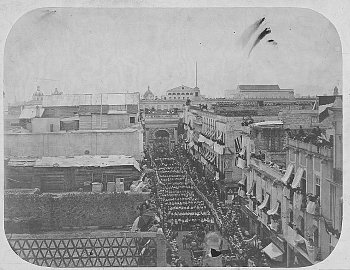
Growing up as orphans in poverty, he and his siblings were left to the care of his paternal grandparents. His mother Brigida García died during childbirth and it has been assumed that his father, Marcelino Juárez, died of complications due to diabetes.
Juárez became a lawyer at 20-years-old after graduating from the Oaxaca Institute of Arts and Sciences, beginning his young life in politics for the advancement of indigenous cultures.
Juárez as Governor
As the governor of Oaxaca in 1847, Juárez became known as anti-clerical but pro-indigenous rights. Because of his progressive work and liberal laws, Juárez was exiled in 1853-1854 to Cuba by then president Antonio López de Santa Anna. While working in New Orleans, Juárez united with other exiled liberals and planned Santa Anna’s downfall. After a coup, Juárez was named the minister of justice of Mexico.
Keeping his anti-clerical trademark, Juárez passed a new constitution for the country limiting church power in 1857. At this point, he was already in Mexico City working as the chief justice of the Supreme Court. The building tension between the conservatives and liberals manifested in the Reform War commencing in 1858 when Juárez declared himself president in Guanajuato after being released from prison, and declared war.
The fight between Juárez, the liberal president, and Félix Zuloaga, the conservative president, was sharply divided due to the view of the church in government. The fight ended when the United States was forced to pick a side, obviously choosing the liberal. Juárez assumed the role of president to a united country on Jan. 1, 1861, becoming the first full-blooded indigenous president of Mexico.
The French Takeover
If that tumultuous ruckus wasn’t enough, it was during Juárez’s presidency that the French decided to step in to collect Mexico’s dues. Though the British and Spanish decided to also collect from the indebted country, the French were the only country that decided to stay, placing their own monarchy to rule Mexico. In 1864, Ferdinand Maximilian Joseph and his wife Carlota arrived in Mexico to assume rule to stabilize the country’s economic and social crises alongside Mexican conservatives.
Juárez did not stop his war against the French. After fleeing the capital, Maximilian was captured and executed in 1867, ending the French rule in Mexico.
Final Days and Health Factors
With his efforts Juárez reestablished the presidential authority along with the Federal Republic of Mexico and was once again elected to the presidency in 1867 and again in 1871. Regardless of the efforts, Mexico was still enduring an economic crises and conflict during his presidential years.
Juárez did not complete his final term, passing from a heart attack in bed on July 18, 1872 after suffering from symptoms such as chest pains and shortness of breath for two days.
With the amount of stress Juárez endured during his life time, it most likely increased his chances for heart disease and eventually a heart attack. Stress, even now, elevates hormones such as cortisol and adrenaline, and makes other risk factors such as high blood pressure and high cholesterol worse. Studies have even shown that stress changes the way blood clots, all of which may have played a role in Juárez’s death.
Being a staunch supporter of indigenous rights and standing his ground for his strong beliefs in the unification of his country, Juárez is seen as the Abraham Lincoln of Mexico. Celebrations take place commemorating his efforts on his birthday, March 21.
